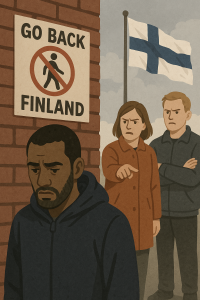Does Teemu Keskisarja speak for himself, or does he bark on behalf of the Finnish government?
“Are they at the same level as Finns?”
On August 27, 2025, during a panel debate on Yle’s A-studio, Teemu Keskisarja, vice-chair of Finland’s nationalist Finns Party, asked a question that reverberated far beyond the studio:
“FOR INSTANCE, ARE AFRICANS AND MIDDLE EASTERN PEOPLE EDUCATIONALLY, CULTURALLY, AND OCCUPATIONALLY AT THE SAME LEVEL AS FINNS?”
He later clarified that he was not questioning human worth, Kauma from the National Coalition Party emphasized that everyone shares the same dignity. But words carry weight, and the framing is far from neutral. By contrasting entire communities with “Finns,” it implicitly ranks people, creating a hierarchy that can seep into classrooms, workplaces, and everyday interactions.

Keskisarja went further, calling recent immigration “a partially realized catastrophe” and referring to “hundreds of thousands of mostly low-quality newcomers,” adding that he values “the quality of the Finnish population more than the quantity.” Even without denying human dignity explicitly, these statements label immigrants as undesirable and inferior, emboldening microaggressions and subtle discrimination.
Subtle Discrimination in Daily Life
These statements are not abstract; they shape lived reality. Immigrants experience them subtly: a lecturer assumes extra help is needed based on your name or skin color; a job application is ignored; casual jokes or offhand comments question your competence.
Surveys confirm these experiences are widespread. According to THL’s MoniSuomi, 42% of immigrants reported discrimination in the past year, most commonly due to ethnicity or origin. EU-wide studies report that 57% of Africans in Finland faced discrimination in the past year, and 66% over five years. Immigrant unemployment is 27.5%, compared to 7.1% for native Finns, and many highly educated immigrants are underemployed in low-skilled jobs. Housing, education, and social inclusion further reflect systemic barriers, not personal shortcomings.

These realities are not evidence of “low quality” or inability, they reflect structural obstacles: language barriers, biased hiring practices, limited recognition of foreign credentials, and institutional discrimination. Blaming immigrants for these outcomes ignores the context and shifts responsibility away from the systems that fail them.
The Human Cost
The consequences of such rhetoric are profound. Subtle discrimination, amplified by public statements from figures in power, erodes confidence and belonging. It whispers: you are not quite one of us; you are a burden; your abilities are in doubt.
For students, it can mean questioning whether their ideas will be taken seriously. For job seekers, it can mean hesitating to pursue opportunities. In everyday life, it creates a constant feeling of measuring yourself against an impossible standard: that of “our kind of people.”
Why Words Matter
Political leaders wield influence not only through policy but also through language. When a prominent figure questions whether Africans or Middle Easterners are “on the same level as Finns,” it legitimizes prejudice and emboldens subtle discrimination. Microaggressions, which might have been challenged privately, become socially permissible.
Finland and any society facing immigration and diversity has the opportunity to act differently. By dismantling systemic barriers, recognizing the value of immigrants, and rejecting narratives of hierarchy, a nation can foster true inclusion. Equality is not just about intent; it requires structural action and accountability.
Can Finland Do Better?
Some claim immigrants are a burden or blame them for societal problems. Let’s be clear: Finland’s economy is not failing because of newcomers, and the days of exploitation and forced labor are long gone. Africans and Middle Easterners are not here to prop up a declining society, they are here to contribute, live, and thrive like anyone else.
Yet systemic barriers in employment, education, and housing continue to limit opportunities. Society must see their talents, hear their stories, and dismantle the obstacles holding them back. Schools, universities, and workplaces must implement anti-bias training, blind recruitment, and inclusive policies. Politicians and public figures who label immigrants “low-quality” or question their abilities must be called out and held accountable, because their words ripple into classrooms, offices, and neighborhoods, normalizing discrimination.
The End Game
When politicians question whether Africans or Middle Easterners are “on the same level as Finns,” it is more than a theoretical debate. It infiltrates classrooms, workplaces, and homes, shaping perceptions and opportunities. Yet the evidence shows a different reality: immigrants are talented, resilient, and eager to contribute. The barriers they face are social and structural, not inherent.
Finland’s strength lies not in fearing difference but in embracing it. Every person deserves to belong, be judged fairly, and be valued. It is time to reject the language of hierarchy and affirm that immigrants are not “other.” They are, simply, our kind of people.





As an enterprenuer in healthcare who have worked in Finland for the last 15 years its so dosheartening to see open discrimination where natives are given customers all the time by the municipal to take care of them yet they just give you a few customers to take care of them just to survive.With the language not being a barrier and or complains from the clients , then it leaves us with no option but look for other countries where our expertise is appreciated.
I have studied for free in Finland and wanted to give back to the society but its so sad when you feel discriminated just because you are a foreigner.